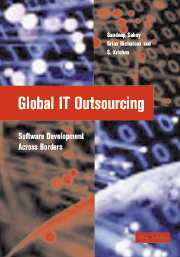Book contents
- Frontmatter
- Contents
- List of figures
- List of tables
- List of boxes
- Foreword
- Acknowledgements
- List of abbreviations
- 1 Introducing the phenomenon of global software work
- 2 Globalization and global software work
- 3 GlobTel's GSA programme in India
- 4 The GlobTel–Witech relationship: a ‘standardization’ perspective
- 5 Global software work: an identity perspective
- 6 The GlobTel–MCI relationship: the dialectics of space and place
- 7 Managing the knowledge transfer process: the case of Sierra and its Indian subsidiary
- 8 The case of Gowing and Eron GSA: power and control
- 9 Cross-cultural communication challenges: GSAs between Japanese and Indian firms
- 10 Reflections and synthesis on theoretical insights
- 11 Managerial implications
- Index
Foreword
Published online by Cambridge University Press: 14 January 2010
- Frontmatter
- Contents
- List of figures
- List of tables
- List of boxes
- Foreword
- Acknowledgements
- List of abbreviations
- 1 Introducing the phenomenon of global software work
- 2 Globalization and global software work
- 3 GlobTel's GSA programme in India
- 4 The GlobTel–Witech relationship: a ‘standardization’ perspective
- 5 Global software work: an identity perspective
- 6 The GlobTel–MCI relationship: the dialectics of space and place
- 7 Managing the knowledge transfer process: the case of Sierra and its Indian subsidiary
- 8 The case of Gowing and Eron GSA: power and control
- 9 Cross-cultural communication challenges: GSAs between Japanese and Indian firms
- 10 Reflections and synthesis on theoretical insights
- 11 Managerial implications
- Index
Summary
Software is a key element in the increasing use of information and communication technologies in contemporary society, and thus its production and use are of major importance. Outsourcing of software production has been common for many years, but since the late 1980s this has increasingly occurred across national and cultural borders, a phenomenon which is known as ‘global software outsourcing’. Cost is a major driver of this, with production normally located in countries with relatively low wage levels, but outsourcing organizations recognize that effective relationships with their software suppliers must be developed and maintained if full benefits are to be realized. This has resulted in various forms of collaborative arrangements, which can be labelled as ‘Global Software Alliances’ (GSAs).
This book provides rich empirical data on Global Software Work (GSW) and associated organizational alliances. The material is derived from the extensive fieldwork carried out by the authors over a number of years, with special emphasis on outsourcers in Canada, the UK and Japan, and companies in India as the software producers. India is a major success story in this area, with quite exceptional growth rates of its software export sector since the 1990s. However, as the book so vividly illustrates, this has not been achieved without lengthy and sometimes painful learning processes on the part of those involved on both sides of the outsourcing alliances. The longitudinal nature of the fieldwork carried out by the authors enabled them to trace and analyse such processes over several years.
- Type
- Chapter
- Information
- Global IT OutsourcingSoftware Development across Borders, pp. xi - xiiPublisher: Cambridge University PressPrint publication year: 2003

